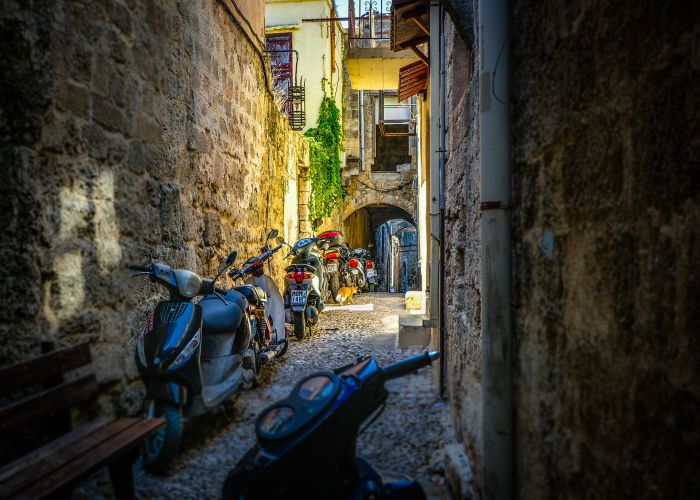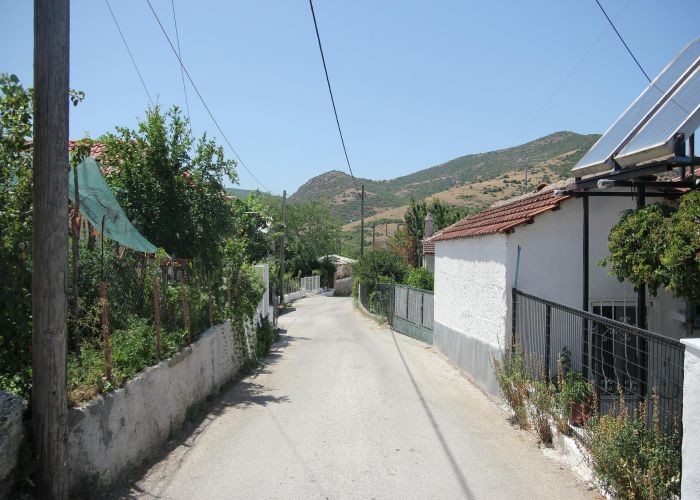
Driving in Greece; A Survival Guide
Key Takeaways
- You must have a valid international driving permit (IDP) or a European Union driving license to drive in Greece if you are from a non-EU country.
- In Greece, you drive on the right side of the road, and the driver's seat is on the left side of the vehicle.
- Major highways and main roads in Greece are generally well-maintained, but rural roads may be narrower and winding. Be cautious of potholes, especially on smaller roads.
- Greek drivers can be assertive and occasionally exhibit aggressive driving behavior. It's important to stay alert, follow traffic rules, and drive defensively.

Driving is another word for independence. If you can drive and have a vehicle, you can take yourself anywhere in the world, explore whichever regions tickle your fancy, and roam the streets with the wind blowing in your face all day long.
Especially if you’re visiting Greece, the urge to do so will multiply, as the magical landscapes offer the ultimate setting for a road trip.
Before you decide to jump on the opportunity to sit in the driver’s seat, however, you must know a couple of things regarding both the driving rules and the driving culture of Greece.
Read below a survival guide to driving in Greece and driving through Greece at your leisure safely!

There's a lot you can enjoy in Greece, and driving is certainly one of those things. In our country, there are no never-ending monotonous roads of the same scenery and chaotic 8-line highways.
On the contrary, the roads of Greece resemble a real-life rollercoaster with lanes that go uphill and downhill and relatively small highways that connect each of those rollercoasters that make up the marvelous Greek land.
What’s more, although during rush hours there is a chance that you may be caught in traffic, -that is, only if you’re staying in one of the big cities- the traffic in Greece is nothing compared to LA traffic for example, even when at its worst.
Things are not always coming up roses, though. Greece is unfortunately famous for its quirky driving etiquette, where ignoring all rules is more of the norm than the exception.
It is common knowledge -even among the locals- that many drivers don't even follow basic rules, such as wearing a seat belt, and are easily distracted; not to mention that road rage runs in most Greeks’ blood. For that reason, there are a few things you must take into consideration.
Driving Requirements

First and foremost, in order to be eligible for driving any type of vehicle in Greece, you need to be at least 18 years old. If you come from a country outside the European Union, you’ll need to obtain an International Driver's License in order to be able to get a car rental.
If you’re not interested in renting from a rental company and have decided to bring your own car to our country, in addition to your International Driver's License, you’ll need a valid registration and proof of internationally valid insurance.
If you plan on staying in Greece for more than 6 months, then you’ll need to convert your U.S. license to a Greek license. If you fail to do so, stiff penalties will ensue, ruining your vacations; t’s just not worth it!
Driving Regulations

Fortunately, there are no big differences between the driving laws and regulations of Greece and those in the European Union, the United States, and the rest of the world. There are, however, small variations you should keep in mind.
Driving side: The first piece of information that will keep you alive if you decide to drive in Greece is that Greeks drive on the right-hand side of the road, unlike the people in the UK and Australia and much like the people in the United States.
Seatbelts: As expected, if you’re sitting on the two front seats of the vehicle, wearing seat belts is strictly mandatory. If I were you, however, I’d wear my seatbelt even if I was sitting in the back of the car. The saying 'better safe than sorry' is in my opinion one of the wisest sayings in the English language.
Children: Children under the age of 10 are not allowed to sit in the front seat in an effort to protect their safety. What’s more, it is obligatory for toddlers under the age of 3 to be seated in a suitable child restraint.
Toll roads: There are only two toll roads on the mainland of Greece: the national road, which is called ‘Ethniki Odos’, and the freeway that connects the central Athens to Athens’ International Airport, called ‘Attiki Odos’.
The entrance fee comes up to a little less than 3€ for a normal car, and the amount can be paid both in cash and debit/credit card.
There is also a Fast Pass system, however, during your stay in Greece, you’ll only have to take a toll road a couple of times, making issuing a fast pass not worth the money or trouble.
Traffic Circles and Roundabouts: Although people coming from the European Union are familiar with traffic circles and roundabouts, American drivers have probably never come across one.
Traffic circles and roundabouts function as an intersection, keeping circulation flowing without the use of traffic lights. What you should know about them though, is that unexpectedly, those entering the roundabout have right of way and not the ones already in them.

Restricted Areas: In order for Athens’ city center and other major Greek cities to be more beautiful for all the visitors that choose it year after year for their vacations, and to minimize the traffic, certain central areas restrict car access.
The restrictions are based on whether each car's license plate ends in an odd or even number, with the odd number being allowed to access the city center for half of the month and the even number being able to enter the other half. Fortunately, these restrictions do not apply to rental cars!
Parking: Within Athens’ city center and other major Greek cities, parking is forbidden within 9 feet of a fire hydrant, 15 feet of an intersection, or 45 feet from a bus stop. You won't come across a fire hydrant often, but if you do, make sure to keep your car away from it.
What’s more, especially in Athens, street parking requires the purchase of a ticket from a mobile app called AthensPass, so make sure to download it ahead of your visit.
Cell phones: Please know that it is strictly illegal to use your mobile phone when you’re on the steering wheel in Greece. If you like to talk on the mobile phone while driving, make sure to purchase appropriate headphones to avoid the hefty ticket that will come upon you otherwise.
Headlights: You should under no circumstances make use of full-beam headlights in urban areas. Besides being a common sense that blinding the other drivers around is a no-go, doing so is also illegal!
Roadside assistance: In case of emergency, you pull your car to the side (!) and 104 or 154 on your phone in order to receive assistance. It is quite a handy service and it has been proven way more useful than one would expect.
Speed Limits

Unless a specific sign for a speed limit suggests different, these are the legal speed limits when driving in Greece:
Please keep in mind that like in all countries, speed limits in Greece are strict and absolute.
Tickets and fines

Breaking the law has its consequences, which in the best-case scenario are economic. Passing red traffic lights, or ignoring a stop sign will cost you 700 €.
Not wearing a seat belt in a car or a helmet on a motorbike will set you back 350 €.
Exceeding the speed limits can set you back from 100€ to 350€.
Talking on your phone without hands-free headphones will cost you 100 €.
Driving under the influence will earn you a ticket that will vary from 200 € to 1200 €, depending on the level of your drunkenness.

Illegal parking can cost you from 10 € to 150 € depending on where you choose your parking space to be, and in the worst possible outcome, it will also cost your license plates, which you’ll be able to get after 10 days minimum.
Keep in mind that if you get caught breaking the traffic laws, along with the fine you’ll have to pay you’re more likely going to have to give up your license from 10 days to 6 months. That will make you have second thoughts about sticking to the speed limits, am I right?
Driving on the Greek islands and rural areas

Driving in the Greek islands and rural areas of Greece can be fun or scary depending on how you approach it. In the islands, roads are very narrow and often with lots of turns. Some mountain roads may have some sort of blind spot.
Be prepared if you're driving along steep cliffs, steep hills, and steep twists. On your journey through rural areas, you will encounter cows or goats, and maybe a variety of rescued Greek pets. While Greek drivers are used to sights like these, you may not be so make sure to keep your eyes on the road and make car horns your best friend.
The most efficient way to be safe and sound is to stick to the speed limits, take it slow, and enjoy the landscape. Keep both hands on the steering wheel, be alert and you'll be just fine!
Use of mobile phones while driving

If you want to use your phone in order to read a map, you need to give it to someone sitting beside you!
Using a phone is only allowed with Bluetooth devices or speakers if they are placed inside a car's designated phone compartment.
Please keep in mind that if you're using your phone in a life-risking way, you will be faced with a ticket or even a revocation of your driving license for up to 60 days.
The Locals' Street Rules

The unique, temperamental character of Greece and its people has resulted in the existence of some street rules that despite them not being laws, they’re often followed more religiously than actual laws.
- First a foremost, the most important and helpful street rule to keep in mind is that there are no rules! Unfortunately, Greeks are infamous for always figuring out ways to go against the law, so don’t expect everyone around you to follow the driving law. Actually, expect the exact opposite; Greek driving is a wild card.
- Although the excessive use of car horns is both annoying and illegal, there is a time and place for everything. In Greece, when you’re driving uphill and taking sharp turns, honk the horn to let the cars in the opposite lane know you’re coming!
- Everyone’s in a hurry! That is especially true for big cities where everyone is running everywhere. For that reason, keep to the right lane, keep to the speed limit and let everyone else pass by; you don’t need the additional stress!
- I know that in any other part of the world the orange traffic lights are a sign of slowing down, but that’s not the case for Greece. Contrary to the driving rules, Greek drivers exhilarate when the traffic lights turn orange, anxious to pass it in time before it turns red.
- For that reason, if you plan on stopping at an orange light make sure there’s no one behind you. You want to slow down gradually end let them know of your intentions, otherwise, there is a fat chance that they’ll crash into you.
- Avoid taxi drivers like the plague. I know it sounds a bit cruel, but the vast majority of taxi drivers in Greece act as if the streets belong to them, paying absolutely no mind to driving rules and laws and doing as they please without a second thought. If you have the opportunity to drive as far away from them as possible, take it! Opt for a car rental, or a car hire to have peace of mind.
- Especially if you’re driving in the Greek countryside, be prepared to experience what it feels like to leave all driving rules behind in the big city. The majority of people in the villages are old, with no good reflexes and a know-it-all attitude that will drive you insane. Still, there is no arguing with them as they make the rules. It is what it is.
- Again in the Greek countryside and the Greek islands it is not uncommon to see a 15-year-old driving, most probably a motorcycle. Act as if you’re the only one on the streets who owns a driving license and drive accordingly.
- The prices of gas vary from gas station to gas station so if you’re on a budget, don’t go straight to the first one you come across. Instead, do your research and find out which one is the cheapest; especially if you have to return your vehicle to a car rental company.
- Ignore all the angry people around you. As mentioned before, most Greeks suffer from a severe case of road rage, treating the streets as a matching ring.
- Pay them no mind and don’t let them influence your driving behavior. Go at your pace, take your time, wear seat belts, and park wherever you choose no matter if there is a big line forming behind you!

- I like to compare motorbikes in Greece to cockroaches: they run like crazy, they’re always where you don’t want them to be, they’re annoying and they’re always in between something.
- It is common knowledge that motorbikes in Greece are above the law, it’s as if driving laws don’t apply to them. One of the most irritating things about motorbikes though is that they never follow a lane but are always in-between two. Keep your eyes peeled and your reactions sharp; comprehensive car insurance would help too!
- Be extra careful when driving across the Athens Riviera at night or at the crack of dawn. It’s a road where unfortunately many serious accidents take place almost daily so keep that in mind and be aware of your surroundings.
- If you decide to drive really late at night or really early in the morning on a Friday, a Saturday, or a Sunday, you must expect people around you to be drunk. Go slow, be cautious, and stay as far from the other vehicles on the street as possible.
- Just because there are signs on the road, it doesn’t mean you’ll be able to spot them. Although written both in Greek and in English, many of Greece’s road signs are hidden between tree leaves, leaving people guessing about the direction they need to follow. If you need to make it to your destination, make sure to actively look for them.
- If you’ve never driven up a mountain before, maybe you should first practice with shorter hills before taking the big step. It’s not too difficult, but it does take getting used to it.
- There is a very high probability of stumbling upon a protest during your stay in Greece. They take place almost daily and they influence the traffic flow immensely. For that reason, make sure to check the internet before you hop on your vehicle to avoid any unpleasant surprises.
- If you have the luxury to avoid leaving Athens on a Friday and returning on a Sunday, do yourself a favor and do so without a second thought. With everyone trying to take advantage of the beautiful weather on the weekends, the roads get swamped and you can find yourself stuck in traffic for hours and hours. No one deserves that.
- The Greeks are amazingly hospitable and are always eager to help those asking for directions, however, the language barrier can be a major problem that oftentimes cannot be overlooked.
- That’s why it would be wiser for you to bring a map of Greece –after all, you don’t want your phone’s battery to die using Google maps- and ask for direction only when absolutely necessary.
- If you’re visiting Greece during the winter, there is a big possibility that you won’t be able to drive up a mountain without putting chains on your wheels. The Greek mountains have snow and ice for the majority of winter, making access to them a bit challenging. Have the appropriate gear with you and ask for help if need be.
- If you’d like to stay at a central sport in the big city make sure the accommodation you’re going to book offers a parking spot. You don’t want to spend your precious time looking for a place to park in the hectic city centers!

- If the first time you sit on the driver’s seat of the rental car you find out that the car is lacking in quality, don’t wait and don’t think twice to return it. It is of bigger importance to be safe than it is to be likable to the rental car company. Check your engine, check your wheels, check your car horn, and check your lights before driving off to the sunset with your rental car.
- Provided that you want to visit the Greek islands, it is will cost much less to just get a rental car from each of your destinations than rent it in Athens and take it around with you! The car tickets for the ferries to the Greek islands are rather expensive and will make a dent in your pocket.
- This one is one of the most important ones: unlike many places in the world, stepping at pedestrian crossings in Greece is never taken into consideration by Greek drivers so if you freeze your vehicle as soon as a pedestrian touches the asphalt, all you’re going to do is cause a serious accident. Pedestrians know it, they’ll never try to pass pedestrian crossings trusting that other drivers are not going to run them over!
Final Thoughts

Extensive, excessive, but incredibly essential, here is the survival guide to driving in Greece that will keep you out of harm’s way.
Driving around a foreign country is a daunting task in any place in the world, let alone Greece. However, now you know better and have all the information that you’ll need to know before starting your fun road trip with your own car or with the help of a car rental company!
If you find yourself greeting your fellow drivers with your car horn and an open palm –a very common rude gesture Greek drivers love to indulge in, the speed limit is a mere suggestion for you, then you’ll know you’ve been in Greece for too long!
Is there such a thing as staying in Greece for ‘too long,’ though? Find out for yourself on a self-drive tour organized by us, or check out our Greece vacation packages and Greece itineraries to discover what you're looking for!
Spoiler alert: No, there isn’t!
Frequently Asked Questions
Is driving in Greece difficult?
Do you need an international driver's license to drive in Greece?
What side is the driver on in Greece?












